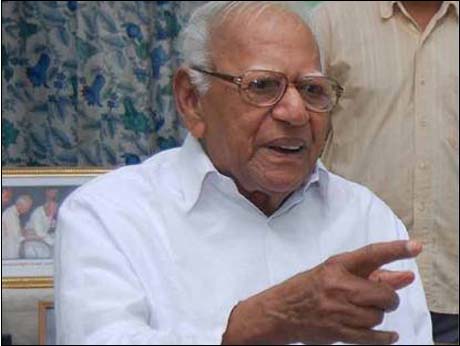
IndiaTechOnline Special
Bangalore, December 5 2014: Justice V.R. Krishna Iyer, who passed away on December 4 within days of entering his100th year, was not known just for his far reaching judicial pronouncements. His humane take on matters of burning public interest was no less noteworthy -- and to reach lay citizens, he turned to The Hindu newspaper, which since 1988 provided him a powerful platform to air his views and reflections on a broad spectrum of issues.
He was a shrewd observer of media, communication and technology and his prescience and grasp of issues like privacy, long before ubiquitous communication media like the Internet were born, is truly amazing.
In the first of a 2-part article in The Hindu in 1990 titled "Privacy of Communication" 1 he writes: "Information without communication is social suffocation and when the State itself practices interception or detention of thought or truth in transit and legitimizes the violation of postal privacy by law, a free society ceases to exist. We must resist to the last, such a sinister prospect".
He goes on to write: "The mere ritualistic recitals of public safety and tranquility, etc. will not make the restriction reasonable. There must be a credible interdict and viable audit of official exercises if the freedom of communication is to be functional. Sufficiently specific grounds and criteria must be written down and other prescriptions laid down before exercise of power by the Government or the officer concerned. What is at stake is the fundamental freedom of expression, of communication, of privacy, of dignity, the very soul of personhood." Justice Iyer is here writing about the interception by the state of postal articles -- but everything he says could have been written as a response to some of the over-reaching provisions of the Information Technology Act of 2000 and its amendments of 2008 and 20009, which caused concern in sections of Indian civil society.
Even more amazing, in hindsight, is Iyer's conclusion, which without altering a single letter, could well have been written in recent days, as a reaction to revelations about the wholesale snooping practised by some of the world's most powerful nations on its own citizens as well as on other governments: "The rapid advances in modern communication systems have led to competitive techniques being developed by State agencies for interceptions and tampering and treachery. Transmission by post and other forms of public telecommunication must be protected from police interceptions. The Constitutional grounds involved are the same... whether the communication is by mail, telephone or telegraph." Add the word Internet to that last sentence and Justice Iyer could have written that column today!
Later in 1990, Justice Iyer returns to the same theme in a piece entitled "Uncensored media - Basic human right" 2, where his target this time, is Doordarshan's subservience to the government of the day: "A Government where flattery, subservience and claques have better chance than free criticism and independent proposals, such a system which seeks to manufacture minds by manipulating views and news has in its genetic code, a fascist seed.... Even today it is common for the viewers of Doordarshan to observe on the screen, the camera focus on Ministers and on functions to the extent the Ministers attend, as if the Doordarshan cosmos exists only when enlivened by ministerial presence. "
In the second part of the article3, Iyer again demonstrates his canny instinct to anticipate trends and technologies (note the use of the word 'informatics'): "Television, without a vision, is technology without humanism. Informatics has bestowed upon the electronic media instant cosmic reach and projection with terrific speed of everything everywhere on our planet. Indeed, the power of Doordarshan, must be geared to third world development in all its dimensions and invigorate youth power, woman power, tribal power, professional power and latent scientific power apart from a dynamic synthesis of the streams of regional culture. Not some sex and song, some Ministers and blase bourgeois celluloid and baloney ads!"
Iyer dealt with the media in the context of a threatened entry of foreign players into the national print arena in a 1995 piece which once more, displays a grasp of issues that continue to challenge and provoke debate: "If the basics of a just world economic order are absent, a just world communication order is an illusion. Communication is a tooland the media are mechanisms for establishing a new world human order where the developing world can rise to fulfill its aspirations of social justice and development without being inhibited and exploited by the economic cannibalism of corporate giantism (sic). That is why the non-aligned countries...have treated it as an imperative of the world communication order that there should be an independent communication network for the Third World without being crushed by informational domination of the materially advanced countries." The Global Positioning System or GPS had barely taken off a year earlier to this piece and was far from the dominant satellite based navigation tool it became.. but Iyer's call for an independent Third World communication system once again anticipates the subsequent security concerns that led India to develop Gagan, her own version of GPS.
- Anand Parthasarathy
( Theis material is extracted from the author's paper entitled:'Compassion on his sleeve': Justice Krishna Iyer's contribution to public policy debate through the columns of The Hindu in the book " A surfeit of tributes to India's greatest living judge, VR Krishna Iyer: A Festschrift" edited by P B Sahasranaman; Universal Law Publishing Co, New Delhi (2014). Reproduced with permission)
References
1. Privacy of Communication: Human right to be preserved; By V.R. Krishna Iyer; The Hindu, February 24 1990
2. Uncensored media: Basic human right; ibid, May 9 1990
3. Freedom with political independence; ibid; May 12 1990 4. Gargantuan media and soft India; ibid March 7 1995